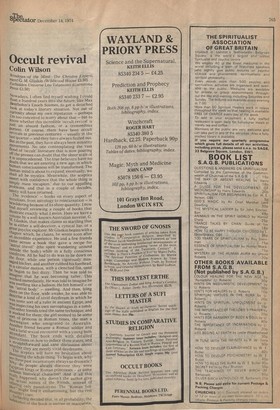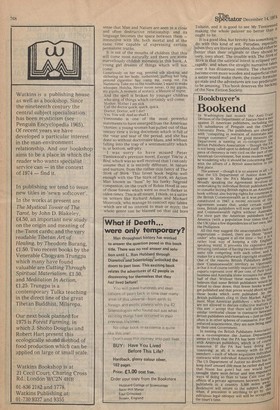Occult revival
Colin Wilson
Windows of the Mind: The Christos rxperiMent G. M. Glaskin (Wildwood House £3.50) Forbidden Universe Leo Talamonti (Garnstone Press £3.50)
Nowadays, I often find myself wishing I could Boat a hundred years into the future,like Max Beerbohm's Enoch Soames, to get a detached look at today's literary situation. Not out of curiosity about my own reputation — perhaps I'm too conceited to worry about that — but to ,know whether this incredible 'occult revival' is Just an absurd fashion, or a tremendous Portent. Of course, there have been occult revivals in previous centuries — usually in the aSt quarter — and they have always fizzled out But in the past, they have always been minority Tovements. No one contemplating the vast l'ethi of 'occult' literature that is now pouring aff the presses can doubt that the sheer scale of it is unprecedented. The true believers have no doubt that we are entering a new age, in which LbliMan consciousness will be transformed. The anan mind is about to expand; eventually, we srlall all be mystics. Meanwhile, the sceptics assert with confidence that the whole thing is simply mass 'escapism,' due to our appalling Problems, and that in a couple of decades, sanity will have returned. The 'evidence' — books on every aspect of occultism, from astrology to reincarnation — is 1).ewildering becuuse of its sheer quantity. 1 now nd myself reviewing a couple of books that Illustrate exactly what I mean. Here we have a volume by a well-known Australian novelist, G. 11\14. Glaskin, that makes claims so startling that C iS either a self-deceiver, a cynical liar, or a geat psychic explorer. Mr Glask in begins with a cnapter which, he claims, he wrote soon after an incredible experience. He and a few friends 'earne across a book that gave a recipe for astral travel" (the spirit wandering around °utside the body) while in a fully conscious F,andition. All he had to do was to lie down on 'me floor, while one person vigorously masNed his feet, and another rubbed his forehead, a circular motion, with a clenched fist, until e began to feel dizzy. Then he was told to Illlagine that he was becoming taller. This W,..orked immediately. He was told to imagine he ,7.as swelling like a balloon. He felt himself — or t.11,s "astral body" — swelling. And then, lying tilere on the floor, wide awake, he was able to :scribe a kind of vivid daydream in which he was some sort of a ruler in ancient Egypt, and .T.L.8 inspecting his own sarcophagus in a tomb.
Other friends tried the same technique, and sort for them; the girl seemed to be some
rt of princess in Roman times, the man a ZI.rWegian who emigrated to Australia. -11?ther friend became a Roman soldier and at",.ua lurid sexual encounter with a young bath in'l'endant. The book ends with detailed 'tructions on how to induce these states, and wfsltraightforward and sane discussion about Cr they are merely vivid daydreams. distrnne sceptics will have no hesitation about itre,hissing the whole thing. To begin with, why-. Wh'llese past incarnations always so dramatic? 11() people always discover they were "an kings or Roman princesses — or some re.411°Lis historical character? And if all this the Y happened, why doesn't the author give ve act names of the friends, instead of dt,,,rual .,ing only pseudonyms. The "Roman SolNI), might find it embarrassing, but the rest uldn't care, k. suhm"llving decided that, in all probability, the anI,-e of the book is untrue or inaccurate,
sense that Man and Nature are seen in a close and often destructive relationship, and its language becomes the space between them — instinctive with life, both mortal and at the same time capable of expressing certain permanent truths.
It is out of the mouths of children that this will come most naturally and there are some marvellously childish moments in this book. A young girl dreams of things which will not come:
Luxuriously on her rug, pretend silk slinking and slithering on her body, turbanned, puffing her long pretend cigarette: Say vamp me, vamp me. I'm Nazimova. Take me to the roadhouse, I want to make whoopee. Hotcha. Never never never. 0 my gigolo, my gigolo. A moment of ecstacy, a lifetime of regret. And the spell is broken by younger children who sing of things which certainly will come: Mother, Mother I am sick Call the doctor quick, quick, quick.
Doctor, Doctor, will I die?
Yes. You will. And so shall I.
Yonnondio is one of the most powerful statements to have emerged from the American 'thirties; a young woman has pulled out of that uneasy time a living document which is full of the wear and tear of the period, and she has done so without doctrinaire blues, and without falling into the trap of a sentimentality which is, at bottom, self-pity.
I was sorry to have missed Peter Tinniswood's previous novel, Except You're A Bird, which was so well received that 1 can only assume that it is entirely different, in nature and nurture, from the rather thin fancy of The Stith of Stirk. This latest book begins well enough with the The Stirk of Stirk, an Action Man known as "bass" by his funky Negroid companion, on the track of Robin Hood in one of those forests which were so much darker in olden times. This is all meant, I think, as a satire on writers like Richard Adams and Michael Moorcock, who manage to concoct epic fables which are of no interest to man or myth; the whole genre can be blamed on that old bore
Tolkein, and it is good to see Mr Tinniswood making the whole palaver no better than it ought to be. It is a good idea, but brevity has something t° do with this kind of wit. Parodies, especiallY w,hen they are literary parodies, should eitherbe better than their originals or they should be very, very short. The trouble with The Stirk Of Sark is that the satirical inten't is eclipsed verY rapidly, and when the straight narrative takes over it has disastrous results, The characters become even more wooden and superficial than a satire would make them, the comic formulae go stale and the adventures are too prediCtable to be amusing. This book deserves the backing of the New Fiction Society.





















 Previous page
Previous page